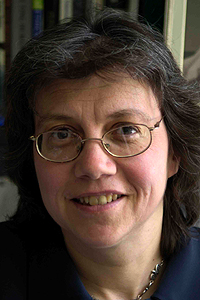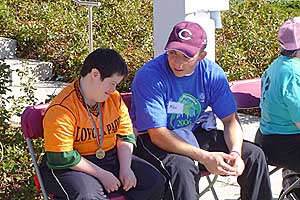Chicago in the News
The Chronicle’s biweekly column Chicago In the News offers a digest of commentary and quotations by a few of the University faculty members, students and alumni who have been headlining the news in recent weeks. Chicago faculty members are some of the most frequently quoted experts, so space allows publishing references to only selected examples. To read many of the full newspaper articles mentioned in this column, visit the In the News column at the University News Office Web site: http://www-news.uchicago.edu/.
Precautionary travel
Jay Purdy, Assistant Professor of Infectious Diseases in Medicine and a travel medicine specialist with the University’s travel clinic, was interviewed for a Tuesday, Sept. 18 Chicago Tribune article that reported on infectious diseases that often are contracted while traveling abroad and what precautions travelers can take. Purdy recommends travelers go to a travel clinic for vaccinations and observation four to six weeks before their departure. In some countries, said Purdy, if officials believe a person has been exposed to yellow fever and not vaccinated for it, “they can quarantine you, which often means you sit in a prison for a few weeks. They can deport you, which usually means they don’t put you on the same plane that you were on; they pull you out and question you until that plane leaves and then just throw you on a random plane. The worst case, though, is they can actually force you to get vaccinated. And that could be a reused needle, a dirty needle, and you don’t have a choice, legally, at that point.”
A worrisome screening
 Lainie Friedman Ross | |
Lainie Friedman Ross, the Carolyn and Matthew Bucksbaum Professor in Pediatrics and the MacLean Center for Clinical Medical Ethics, was quoted in a Wednesday, Sept. 19 Chicago Tribune story that reported on prenatal genetic screening, especially the screening for Gaucher, a genetic condition with symptoms that range from severe to nonexistent. It occurs mainly in women of Eastern or Central European Jewish descent and the screening for the condition is part of a panel of tests given to women in this group. “Why do we bundle them all in one panel? Because we can,” said Friedman Ross. “Should we? Not yet. Not when we can’t know which individuals with Gaucher will be significantly affected and which won’t.” The result of such screenings often is termination of pregnancies. “The fact that people are aborting for such a mild, benign condition is worrisome,” said Friedman Ross.
Detaching from distress
Research led by Jean Decety, Professor in Psychology and the College, was the subject of several news outlet reports, including articles published by Forbes, The Times of London and Healthday. Decety and his colleagues at the Taiwan Institute of Neuroscience completed a study on the ability of physicians to switch off the part of the brain that helps them appreciate the pain their patients experience during treatment, and instead turn on a portion of the brain that controls emotions. Said Decety, “They have learned through their training and practice to keep a detached perspective; without such a mechanism, performing their practice could be overwhelming or distressing, and, as a consequence, impair their ability to be of assistance for their patients.” The study was published in the journal Current Biology (see story on Decety’s research on Page 1).
 Mike Harriet | |
He's on the Good Works Team
Mike Harriet, fourth-year in the College, was featured in the Thursday, Sept. 20 Chicago Sun-Times for being among a group of players selected by the American Football Coaches Association to its Good Works Team. The honor recognizes young players who have been committed to community service. Harriet coordinated volunteers for the Chicago Special Olympics Spring Games, tutored with the Friends of Washington Park program and two area elementary schools, and initiated and completed house improvement projects. He was one of 11 players chosen from four college athletics divisions, including the Maroons’ Division III. “The guys on the team are the reason I have been able to do this,” said Harriet. “They have been very receptive. Everyone has helped at least once. Volunteering is very important to me, and my teammates believe it’s important. We make the time for it after the football season.”Our evolving moral reasoning
Geoffrey Stone, the Harry Kalven Jr. Distinguished Service Professor in the Law School, wrote an op-ed that questions the reasoning behind the arguments against marriage between two people of the same sex. The piece was published in the Sunday, Sept. 16 Chicago Tribune. Stone wrote that if Americans had, over the years of the nation’s history, come to view sexual discrimination as similar to racial discrimination, then that same moral reasoning could bring up new questions about discrimination against other groups of individuals, such as gays and lesbians, and people with disabilities. “In the end, we must rely on our deepest moral intuitions, our commitment to individual dignity, our belief that all persons ‘are created equal’ and our common sense to draw the ‘right’ lines for our generation.” Stone noted that such questioning is necessary for an ever-evolving society. “If we did not ask such questions, we would still burn witches, buy slaves and deny women the vote,” wrote Stone.
Denied everything
Dan Slater, an Assistant Professor in Political Science who specializes in Southeast Asian politics, wrote an op-ed that appeared in the Friday, Sept. 21 Christian Science Monitor. Slater pointed out the differences between China and Burma, though both countries have had internal confrontations with democracy. Burma’s economy is in “shambles” and its people have lost not only their political freedom but also any chance for economic opportunity; whereas China’s citizens benefit from an economy that is booming. In his commentary, Slater argues that China’s leaders should not align themselves with Burma’s military rulers to protect their economic and geopolitical interests in Burma. “China does itself no favors by associating itself—and thus implicitly equating itself—with such a regime. There is a clear difference between the many regimes in the world that deny their citizens democracy and the smaller number that deny their citizens everything. China belongs in the first category, while Burma belongs in the second,” wrote Slater.
Attractive tinkering
New accounting research conducted by Douglas Skinner, the John P. and Lillian A. Gould Professor of Accounting in the Graduate School of Business, was featured in the Tuesday, Sept. 23 New York Times. Skinner found “compelling evidence that companies often tinker with their earnings to make themselves look more attractive,” the article noted.
![[Chronicle]](/images/sidebar_header_oct06.gif)